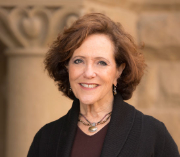- Toolkits
- Are You Ready to Talk?
- Beyond the Line
- Blocking Gender Bias
- Edgy Veggies
- First-Gen Ascend
- Fishbowl Discussions
- Measuring Mobility
- Peaceful Politics
- Plot the Me You Want to Be
- RaceWorks
- Rethinking Stress
- Space Reface
- Team Up Against Prejudice
- United States of Immigrants
- Kit Companion: Map Your Identities
- Kit Companion: LARA
- Collections
- Action Areas
- About

Harnessing Possible Selves: Q&A With Hazel Rose Markus
Stories From the Field
Harnessing Possible Selves: Q&A With Hazel Rose Markus, Ph.D.

Dr. Markus is a pioneering cultural psychologist, SPARQ’s faculty co-director, and the Davis-Brack Professor in the Behavioral Sciences at Stanford University. She conducted the early research that inspired this toolkit.
SPARQ: How did you become interested in possible selves and identities?
Markus: I’ve always thought that if you want to understand human behavior, you need to start with what a person thinks they are up to in this world. How do they think of themselves? What do they think they are doing? What do they think they are supposed to be doing? The idea of what’s possible for yourself, both positive and negative, is a big part of understanding human psychology.
SPARQ: Please describe some of the early basic research on academic selves.
Markus: In my and Daphna’s [Oyserman] first study, we started with delinquent boys who were at institutions of “last resort.” We found that one of the many problems these kids had is that they had more and clearer feared possible selves than desired possible selves. This is not a good motivational system: you know what you are running from, but you don’t know what you are running to. In theory, you need to have a balance in your possible selves, for the most motivation. It’s one thing to be worried that you’re not going to do well. That’s pretty motivating, but it’s even more motivating also to want to do well and to be a good student.
SPARQ: Was there anything new or surprising about your findings?
Markus: That possible selves were a better predictor of wellbeing and self-esteem than one’s actual self. The possible self is an active and important ingredient of your whole self. It’s a sense of what can be possible for you that keeps you going emotionally, that motivates.
SPARQ: Can other people help you attain your possible selves?
Markus: Yes! One of the really important aspects of a relationship is that somebody “gets” your possible selves. I think good relationships are often built on somebody recognizing what is possible for the other person’s future and supporting that, and not undermining those goals.
SPARQ: Is there only one way to attain a possible self?
Markus: No! For example, there are multiple ways to be a student. Possible selves can make people think about the way they want to be and make them strategize about how to create these selves using various methods.
SPARQ: How long-lasting are the results of possible selves interventions?
Markus: It’s an empirical question that needs to be tested. So far, we have seen results up to two years after an intervention to help children understand and connect to their possible selves. We also know that fostering the idea of possibility, and having people think about how to attain these possibilities, can be especially beneficial for low-income children and children of color.


